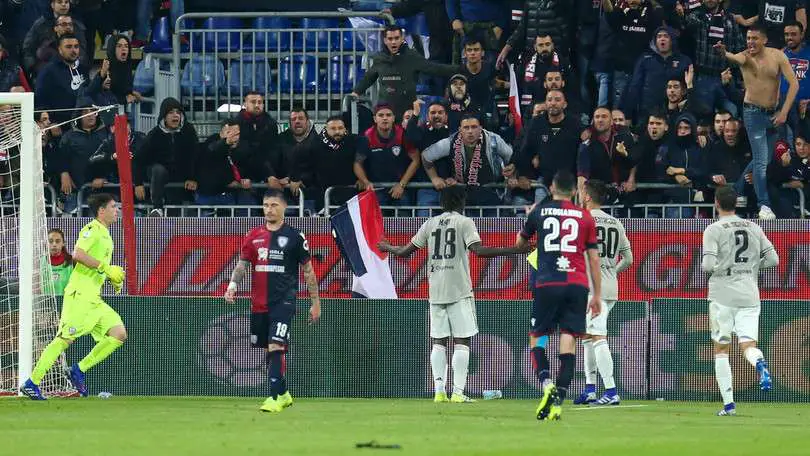Last Tuesday, Moise Kean and his Juventus teammate, Blaise Matuidi, were the targets of racist abuse during the Italian champions visit to Cagliari. The actions of the Cagliari fans were widely condemned by players and pundits across European football. Yet will the Cagliari fans be severely punished? Probably not. Let’s take a look at how racism continues to be a problem in Italian football, and what can possibly be done to address the situation.
Weak sanctions
Matuidi is no stranger to having racial slurs aimed at him since joining Juventus in 2017. “It happened to me in that very same stadium last year,” the French international said when reflecting on last week’s incident.
That was not the only occasion either. In December 2017, Matuidi was on the receiving end of racist abuse from Hellas Verona supporters. The punishment that day: Verona were hit with a €20,000 fine and a partial stadium closure suspended for a year. €20,000 may sound like a lot of money for the ordinary person on the street, but for a football club, it is a tiny amount. Is it enough to deter fans from doing the same again? No.
No more looking for excuses
When looking at the specific incident from last week, one element of the incident that sticks out is the reaction from players and the media in Italy. Leonardo Bonucci, Moise Kean’s teammate, stated after the game that the blame should be shared “50-50” between Kean and the Cagliari fans, making the point that Kean should not have celebrated in front of the opposition supporters in the way that he did.
The Sardinian newspaper, L’Unione Sarda, said that it needed to be established “did they target Kean after his provocation, or before, because of the colour of his skin?” then going on to say “either way, racist abuse came from a handful of people at most.” These types of reactions to racism highlight how big a problem racism is in Italian football. The wrong questions are being asked. Excuses are being made.
Bonucci’s comments drew immediate criticism, with Raheem Sterling saying “all you can do now is laugh,” whilst Mario Balotelli, who suffered racist abuse during his time in Italy, claimed that the Italian defender was “lucky I wasn’t there.” Defending the actions of racist supporters is not the way forwards, and trying to determine whether racism happened before or after provocation is irrelevant. Racism cannot be accepted under any circumstances, no matter what has gone before.
Should players walk off?
It has been suggested that players should walk off the pitch when they are subjected to racist abuse. UEFA president Aleksander Ceferin said he will tell referees “not to be afraid to act” if racist chants continue to occur during games. This is a step in the right direction, but then what happens?
Back in 2012, then UEFA president Michel Platini stated that players would be booked if they walked off the pitch because of racist abuse during Euro 2012. Thankfully, Ceferin seems to not take such a brainless view, yet it seems that players do not have faith in the authorities to offer them the support that they require.
Last week, England and Tottenham footballer Danny Rose spoke openly about the racist abuse that he had faced whilst on international duty against Montenegro in March. Rose said that England’s manager Gareth Southgate “was fully behind me if we wanted to walk off. I just wanted to get the three points and get out of there as quickly as possible.” Having been through these type of situations before, Rose knew that the punishments handed out are not good enough, meaning he opted to stay on the pitch.
That approach is understandable. Until there is a clear process in place as to how racism in football grounds will be handled then this divide between clubs and the authorities will continue to exist, meaning that effective solutions will not be put in place.
Could stadium closures work?
Another solution is closing stadiums. After their fans were found guilty of racist abuse towards Napoli’s Kalidou Koulibaly, Inter Milan were handed a stadium ban in January of this year. This solution is stricter than a fine, and it does punish fans directly; behave inappropriately and you aren’t welcome at the next game.
However, in March, Inter’s fans were again guilty of racially abusing a player, this time Franck Kessie in the Milan derby. They were hit with a suspended stand closure, meaning that no immediate punishment was forthcoming. This makes a mockery of the issue and appears to be a step backwards. How can the sanctions for the second crime be less than for the first offence? It does not make sense and gives the impression to fans that they can continue to behave in a vile manner. So perhaps a step further is necessary.
Deducting points
This is an extreme measure, but one that ought to be considered. Severe punishments need to be put in place to deter fans from racially abusing players. If clubs whose fans persistently offend were hit with point deductions, this may make the fans think again. Fines do not affect fans, and stadium closures have not had the desired effect either.
Yet if a team battling relegation were to drop down a division due to racist abuse from their fans, or a side aiming for a Champions League place missed out for the same reason then this would bring supporters’ behaviour into the spotlight more. Fans would have to reflect on their actions and how they have cost their club. They would have no one to blame other than themselves. Finally, racist supporters would be accountable for their actions.
Looking ahead
The Moise Kean incident last week threw up all kinds of emotions from onlookers. Anger being the main one that this is still happening in 2019, but ultimately this has happened so often in Italy and is not a major surprise at all. That is the sad truth.
Kean is just 19 years of age and has a very bright future. However, if he continues to face nights like last Tuesday, with fans hurling abuse and his own teammate criticising him, there is the worry that he will be left feeling isolated and will not reach his full potential. That cannot be allowed to happen to him or any other players from an ethnic minority.
It is time for the authorities to act and send out a clear message to those who behave so shamefully. Thus far, they have not done so. Pele described football as “the beautiful game.” It is time to stamp out its ugliest side.









